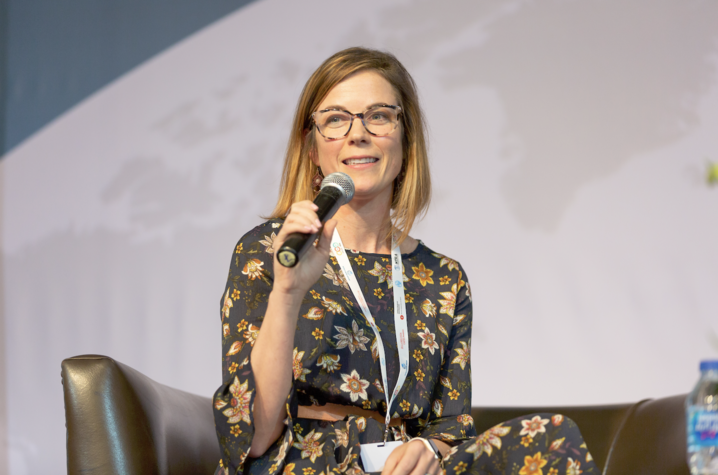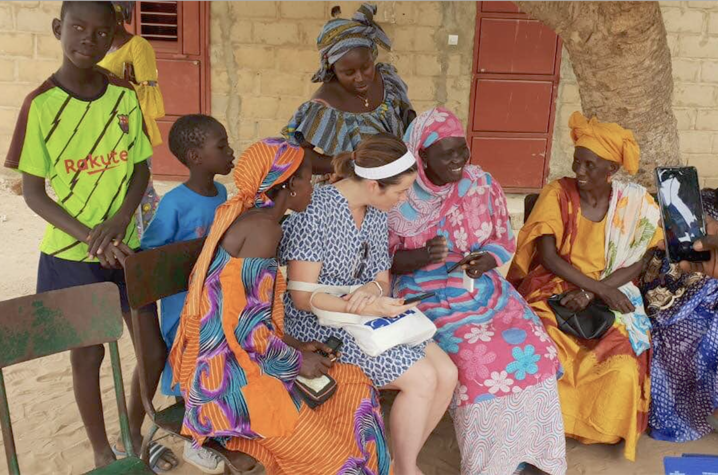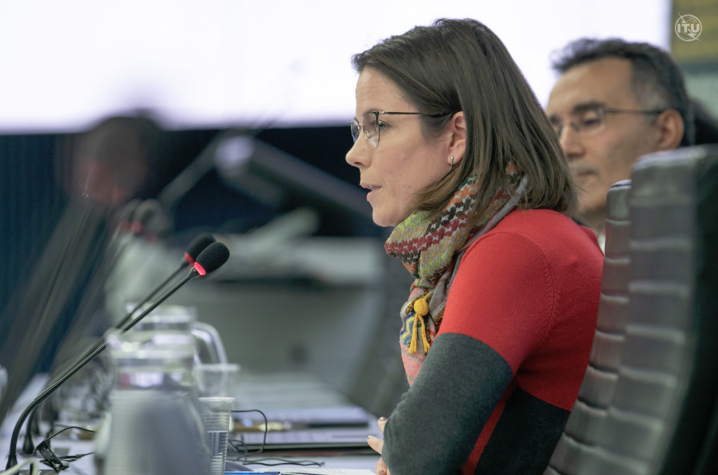Investing in Global Gender Equality: Q&A With UK Alumna Jamie Zimmerman
LEXINGTON, Ky. (March 16, 2021) — UK alumna Jamie Zimmerman’s passion for gender equality and interest in financial inclusion began early.
She grew up surrounded by strong women in Lexington, Kentucky, where many families, including her own, “teetered at times on the brink of financial uncertainty.”
Zimmerman graduated with a bachelor’s degree in foreign languages and international economics from the UK College of Arts and Sciences in 2002. Immediately after, she enrolled in the Patterson School of Diplomacy and International Commerce and earned a master’s in international political economy with a concentration in international development in December 2003.
Today, she helms the Bill & Melinda Gates Foundation Financial Services for the Poor team’s gender equality and women’s empowerment strategy.
UKNow sat down with Zimmerman to learn more about women’s empowerment and financial inclusion, how COVID-19 has impacted gender equality, and how her experience at UK impacted her career.
*
UKNow: What influenced you to choose UK for both undergraduate and graduate school?
Zimmerman: I was born and raised in Lexington, in a typical “Bleed Blue,” working class household of diehard Cats fans and UK loyalists. Both of my parents attended the University of Kentucky, though life circumstances prevented them from graduating. As the third of four children, in-state tuition and proximity to friends and family made UK a natural and practical choice for my undergraduate education.
The university had recently launched an interdisciplinary, globally focused double major — foreign languages and international economics (FLIE). I admit that I didn’t have a grasp of what economics was when I was 17 years old, but I knew I had a love of languages, a passion for global studies and a dream of an international career.
The reputation of the Patterson School preceded it, and after four years of class sizes typical of state schools, I craved the intimacy of a smaller program. Acceptance into the program was not something I took for granted; very few members of my family had finished college and I’d be the first admitted to a graduate program.
UKNow: What experiences did you have outside the classroom while at UK that contributed to your career path?
Zimmerman: I was one of the thousands of typical UK students who had to work through undergrad and graduate school to cover expenses. Staying true to my passion for international relations, I volunteered as a Spanish tutor and as an international student ambassador.
During my first visit to the Office of International Affairs in Bradley Hall freshman year, I had only imagined maybe getting to spend a summer abroad. Two years later, I set off for my junior year abroad, one semester in the arid heat of Seville, Spain, and another at the base of the Alps, in Grenoble, France. I traveled all over Europe, and even to Egypt, that year, and experienced a mind-blowing expansion of life experiences, friendships and my horizons.
UKNow: How did your undergraduate and graduate education at UK prepare you for your current position?
Zimmerman: I look back on my years at UK as formative in both mind and spirit, and point to three factors — all rooted in amazing teachers and staff — that have been foundational as I’ve built my career and life in the years since.
First, I benefited from studying under several professors, male and female, who gave me their time and energy, taught me to believe in myself, in my intellectual capacities, and in my professional prospects.
Second, interdisciplinary studies helped me to see the world and the people within it in all its beautiful complexity. It taught me the value of understanding and applying interdisciplinary theory and thinking into practical action. Third, I learned the value of connection and building networks for personal and professional growth. It was a keynote speaker I met at the 2003 Patterson School annual Board of Advisors conference who gave me my first job in Washington, D.C. in 2004.
Through these influences, I came to believe I could sit at any table and that my voice has value. More importantly, they helped to shape my understanding of the world and of global poverty: namely, that the issues that keep people from living their full potential in this world are largely driven by systems built to exclude, by ineffective or discriminatory policies, and by market failures.
I finished my time at UK with a determination to contribute where I could to fix the systems, to change the policies, to ensure we can all benefit from our interconnectedness, and with a passionate conviction that everyone should have an equal opportunity to live a healthy, productive life.
UKNow: What inspired you to work in your current field?
Zimmerman: I can’t point to any one particular moment, but I can say that financial inclusion and women’s empowerment are personal to me. I didn’t grow up in what you’d describe as a financially savvy household, but I did grow up surrounded by amazing, strong women who pushed their daughters to see and exercise their power, to have independence and autonomy to take control of opportunities in our lives that they were not so easily afforded.
Right around the time Mohammed Yunnus won the Nobel Peace Prize for his work on microfinance, I learned about the fields of financial inclusion and asset building for the poor. These concepts resonated (and still do) on a deep level, and I’ve since been passionately dedicated to understanding and addressing inequities and systemic failures that drive inequalities in access to services, in pay, in control over and opportunities to build and grow wealth, and in resources for the historically excluded and marginalized, particularly women.
UKNow: Why is it critical to be investing in female financial access and usage?
Zimmerman: In her book, ‘Moment of Lift,’ Melinda Gates says so elegantly, “If you invest in women and girls, you invest in everyone.” Evidence globally shows consistently that when women earn or receive money, have the control and autonomy over its management, they and their families fare better, are more likely to be resilient to shocks, and to build pathways out of poverty. McKinsey Global Institute estimates that we are forgoing between $12 and $28 trillion in global economic growth due to gender inequality in labor force participation and pay.
Digital tools and financial access hold promise to drive women’s economic empowerment through enabling access to and control over financial resources, but that promise will be limited if we don’t address severe gender gaps. The financial system was not designed by or for women, and globally women face several disadvantages that keep them from having access to or easily using these systems. There is a nine percentage point gender gap in financial access globally.
At the Gates Foundation we believe that equal is greater, and that gender equality can’t wait, so our gender equality strategy is to invest in efforts to address structural barriers and gaps, open pathways to economic opportunity, and to put women at the very center of our work.
My team’s work on women’s economic empowerment and financial inclusion is but one piece of a complex puzzle we must urgently solve.
UKNow: Why is it so important to you to be focusing on gender equality?
Zimmerman: For so many, COVID-19 has offered an awakening to the disadvantages and inequities women face, the burdens we carry, the role we play in the economy as first responders, as caregivers, as essential services providers. Job losses, businesses and school closures are disproportionately impacting women, taking existing inequalities and barriers and exacerbating them. In December, women accounted for an astonishing 100% of all job losses in the United States, according to Forbes.
Globally, the pandemic is pushing millions into poverty, particularly those in informal labor (women) who largely do not benefit from access to a formal safety net (women), and who take on the majority of domestic and caretaking responsibilities (women).
Through this pandemic, governments have been seeking to contain the health impacts of the COVID-19 outbreak while simultaneously working to limit the economic hardships it has wrought. We have been actively working with governments and global partners to build the systems and services that will get life-saving resources to women and their families quickly and at scale.
This year has revealed so much about the pressures and barriers that women face, and I believe placing women at the center of our investments will help to ensure that this is a moment of opportunity for women’s empowerment and not one of regression.
UKNow: Do you have any advice to share for UK students who want to make an impact, but don’t know where to start?
Zimmerman: I truly believe this: purpose and passion feed each other and if pursued authentically, I believe they will be the truest drivers of your impact. And because of our individual uniqueness and humanity, no two definitions of impact are the same, nor the journey towards it. Be open to the journey while grounded in your principles and focused on your purpose and you will undoubtedly find your way.
March is Women’s History Month. Celebrate the amazing, powerful women in your life, and help support gender equality locally. With support from the foundation, I am committing $5,000 to women’s empowerment in Kentucky, spread across these organizations:
As the state’s flagship, land-grant institution, the University of Kentucky exists to advance the Commonwealth. We do that by preparing the next generation of leaders — placing students at the heart of everything we do — and transforming the lives of Kentuckians through education, research and creative work, service and health care. We pride ourselves on being a catalyst for breakthroughs and a force for healing, a place where ingenuity unfolds. It's all made possible by our people — visionaries, disruptors and pioneers — who make up 200 academic programs, a $476.5 million research and development enterprise and a world-class medical center, all on one campus.







